Losing weight is one of the burning desires of women after giving birth. However, the thing you need to pay most attention now is to supplement with foods that can provide the best source of energy for the body.
If you are breastfeeding, the quality of the milk will not change much regardless of the type of food you eat. The problem here is that if you do not get enough of the nutrients it needs from the diet, your body will take the stored nutrients. So make sure you get enough nutrients when you eat and drink to meet your baby's milk supply needs.
You should include 12 types of superfoods below to ensure your body absorbs all the essentials for both you and your baby.
Salmon
Salmon is almost the perfect choice for mothers to nourish. Salmon provides a type of fat that is very important to the development of the baby's nervous system called DHA. Breast milk contains higher levels of DHA and is higher than foods that provide DHA from the diet.
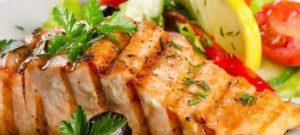
The DHA in salmon can also help improve your mood. Studies have shown it to play a key role in preventing postpartum depression .
However, the FDA recommends that pregnant and lactating women limit their intake of salmon to about 340 g for 1 week because salmon contains low levels of mercury. Some other fish species such as swordfish and mackerel are high in mercury and should not be eaten at all.
Low-fat milk
Milk, yogurt, cheese and dairy products also play an important part in the nutritional supplementation of breast milk. Milk provides vitamin D to help strengthen bones. In addition, dairy products also provide the best protein, B vitamins and calcium. If you are breast-feeding, the calcium in breast milk will help your baby's bone development. Therefore, you should drink three cups of milk per day.
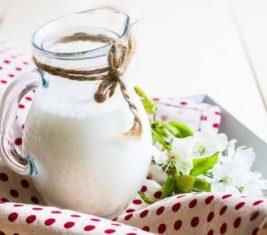
Lean beef
To boost energy, new mothers should eat iron-rich foods like lean beef. Iron deficiency causes you to consume more energy and make it more difficult to meet all the needs of your newborn baby.
In addition, beef is an excellent source of protein and vitamin B12. These are 2 micronutrients that new births need to supplement.
Legumes
Legumes are rich in iron and protein , especially dark-colored legumes like black and red beans. They are also great for breast milk and suitable for vegetarians.
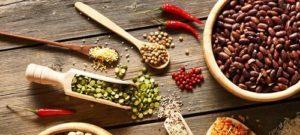
Blueberry
Nursing mothers must get 2 or more servings of fruit or juice per day. Blueberries are an excellent choice to meet your needs. They are both delicious and a great source of vitamins and minerals. In addition, blueberries also provide a nutritious amount of carbohydrates to keep your energy levels high.
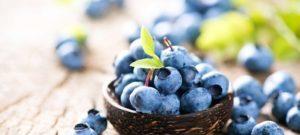
Brown rice
Losing weight too quickly after giving birth will cause you to make less milk and slow you down. Include whole grains like brown rice in your diet to boost your energy levels without causing you to gain too much weight. Brown rice provides the body with the calories it needs to produce the best quality breast milk for your baby.
Oranges
Oranges are a great food for energy boost, both convenient and nutritious. Oranges and other citrus fruits enhance the quality of milk. Mothers who are breastfeeding need vitamin C more than women while pregnant.
If you do not like to eat oranges, you can sip a few glasses of orange juice to supplement natural vitamin C instead of using other calcium supplements.
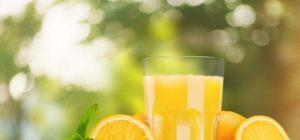
Egg
Eggs are an easy to find food to meet your daily protein needs. Have two eggs for breakfast, one hard-boiled egg for lunchtime salad or one omelette and dinner salad. Eggs both boost DHA and increase the level of essential fatty acids in breast milk.
Noodles and sandwiches
Folic acid is very important for your baby's development in the early stages of pregnancy. However, its importance does not end there. Folic acid is an important nutrient in breast milk for providing your baby with good health and it's also important for your health. Whole grain breads and pasta are excellent sources of folic acid. Besides, these foods also add to you a plentiful amount of fiber and iron.
Green vegetables
Leafy green vegetables like amaranth, turnips and broccoli are high vitamin A foods that are good for you and your baby. They are also a good source of calcium, vitamin C and iron. Green vegetables are also heart-healthy antioxidants due to their low calorie content.
Grains
A night without sleep to care for your baby takes a lot of energy. One of the best energy-boosting foods for new mums in the morning is whole grains. Many cold grains are also fortified with vitamins and essential nutrients needed to meet your daily nutritional needs. You can make breakfast more delicious and nutritious by squeezing blueberries with water and cream and watering them into a cereal bowl.
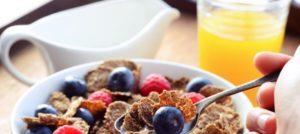
Country
Breastfeeding women often become dehydrated, leading to a loss of energy. To keep energy levels and milk production steady, you must stay hydrated. You can also drink juice instead of water.
In addition, you need to avoid caffeinated beverages like coffee or tea because caffeinated breast milk can make your baby cranky and difficult to sleep.
In general, breastfeeding women will need 500 more calories than mothers who do not breastfeed, which means you need about 2000-2500 calories per day. However, you do not need to calculate too much of these calories, but listen to hunger to know how much you need to eat.

















